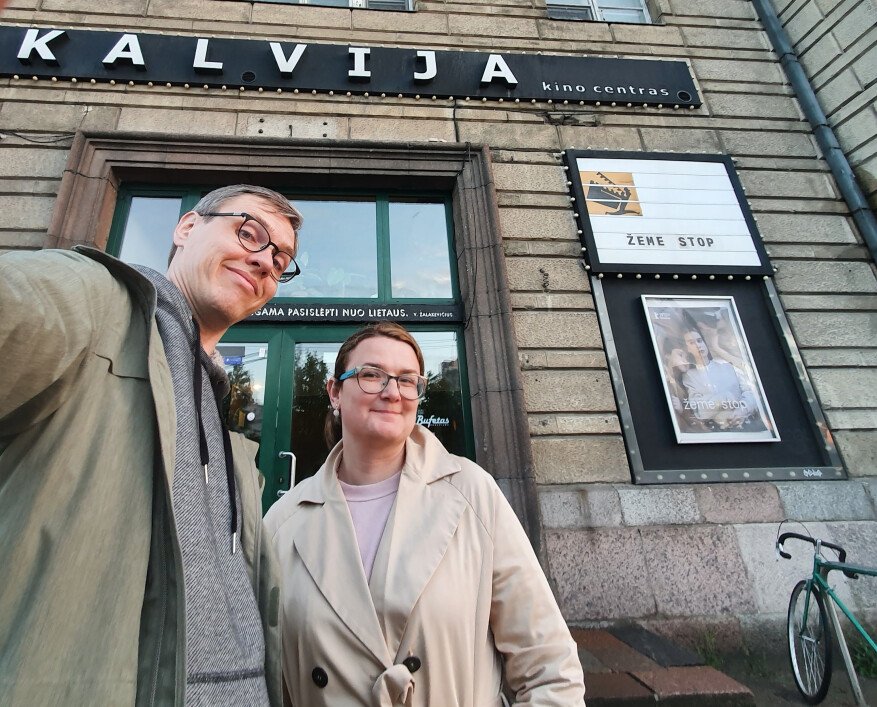At Skalvija Kino Centras in Vilnius
Sigrid Butlers
Since Skalvija cinema in Vilnius has been building their educational programme for the past fifteen years and is leading the way with their school programme catalogue in and around Vilnius, it looked as the best place for me to learn from in order to start a similar programme of our own in Tartu at Elektriteater. Moreover, it was a perfect match in more senses than just this.

First, Skalvija cinema is located in a wonderful mid-20th century apartment building just next to the opera and ballet theatre sharing its space with a cinematheque and a cosy cafe. Film lovers know well the cinema for its programming focusing on non-commercial European and world cinema (both classics and recent films) and hosting special events, festivals, meetings with filmmakers, retrospectives, etc. All this is very similar to our tiny cinema in Tartu. Second, I was amazed by the efficiency of the small team and how well every day work is managed.
“Mokausi iš kino” means “I Learn from Cinema”
On our first day, Vilma Levickaitė, head of Skalvija welcomed us, showed us around the wonderful cinema building, and introduced her team.
Next, Vėjūnė Dūdėnienė the coordinator of educational programmes at Skalvija made a very thorough introduction to the project “Mokausi iš kino”. This national film education project aimed at schoolchildren has been running since 2011. Children can watch more than fifty films that cover topics relevant to young people of different ages. The aim is to introduce young audiences to various cultural, historical and social experiences, and help them to understand and appreciate them. For each film, Skalvija provides methodological material specifically for educators, which helps them to organise the discussion of the film in the classroom.
There is a “Mokausi iš kino” catalogue, available both online and in print, with all the films. In addition to cinema visits, the programme also offers discussions based on the film for the entire class, led by a professional moderator or a person with a background in cinematography. “Learning from Cinema” screenings are special screenings and not part of the regular programming. They take place at a convenient time for teachers and students - in the first half of the working day. The screenings can be booked in eight Lithuanian cities: Vilnius, Kaunas, Klaipėda, Panevėžys, etc. Reviews and film screenings can also be held in the classroom or at home via VOD.
The educational programme Mokausi is kino is supported by the Lithuanian Culture Council and was founded by the national initiative called the Cultural Passport. The initiative started in 2019 and is aimed at improving schoolchildren’s access to cultural and educational projects and events. Vilma Levickaitė walked us through the application process and requirements for cinemas and other cultural events and services. She also introduced us to other possible ways to fund educational programmes, like international projects and cooperation with cinemas in the region. In my opinion, it was very well managed at Skalvija and is something well worth looking into.
To make it a little more hands on, I also attended a school screening to see how they introduce the film and debate. In addition to this, we also had a film director-lead screening of the film Zemljia - Stop with Kateryna Gornostai from Ukraine.
As a surplus, I got an overview of how the communication process with school works at Skalvija. Greta Ramanauskaitė gave an overview of tools that the cinema uses to facilitate the communication process from newsletters and Facebook campaigns to print media and organising special events and workshops for teachers and students. I got useful insights from her on what to focus on while building the audience consisting of teachers and schoolchildren. We talked about the pros and cons of various communication tools, looked at the statistics. I got a good idea about the best practices and made a plan about where to start with our own educational programme.
Skalvija Film Academy (SKA)
Another very impressive and exciting activity that Skalvija is leading is the Skalvija Film Academy, founded in 2007. About 30 students graduate from SKA each year. After graduation, they often go on to study at the Lithuanian Academy of Music and Theatre, and study in France, Great Britain, the USA and Russia.
SKA students attend film history, film directing, editing and other masterclasses, perform creative tasks and make short films. Professional representatives of the film industry - directors, camera operators, stage and costume designers, editing specialists, and actors give SKA lectures. It is also a way to get young film enthusiasts to work as volunteers at the events of Skalvija and other organisations take part in various additional activities - they go to filming sites and get involved in cinema life in Vilnius. During our stay, we had a wonderful opportunity to be part of the graduating class’ film screenings and attend jury duty to choose the best student film of 2022. The cinema became alive with hundreds of young film enthusiasts and it was great to see how excited they all were about their films being screened publicly, not to mention the high standards of the films themselves. The Lithuanian Culture Council also supports the SKA project.
In addition to meeting the wonderful people at Skalvija, we also had a quick trip to the current European capital of culture Kaunas to see the newly renovated Romuva cinema and to participate in the culture programme that the city offers, and had a tour around the newest cinema in Vilnius Paupio district, Passaka. Both of these cinemas also participate in the “Mokausi iš kino” programme led by Skalvija.
I left Vilnius with a bunch of new and exciting ideas and a clear perspective on how to start the educational programme at Tartu Elektriteater. I hope to see my new friends in Vilnius soon and to cooperate on a project or just to exchange great ideas and practices.
__
Sigrid Butlers, Tartu Elektriteater
July 2022
__
